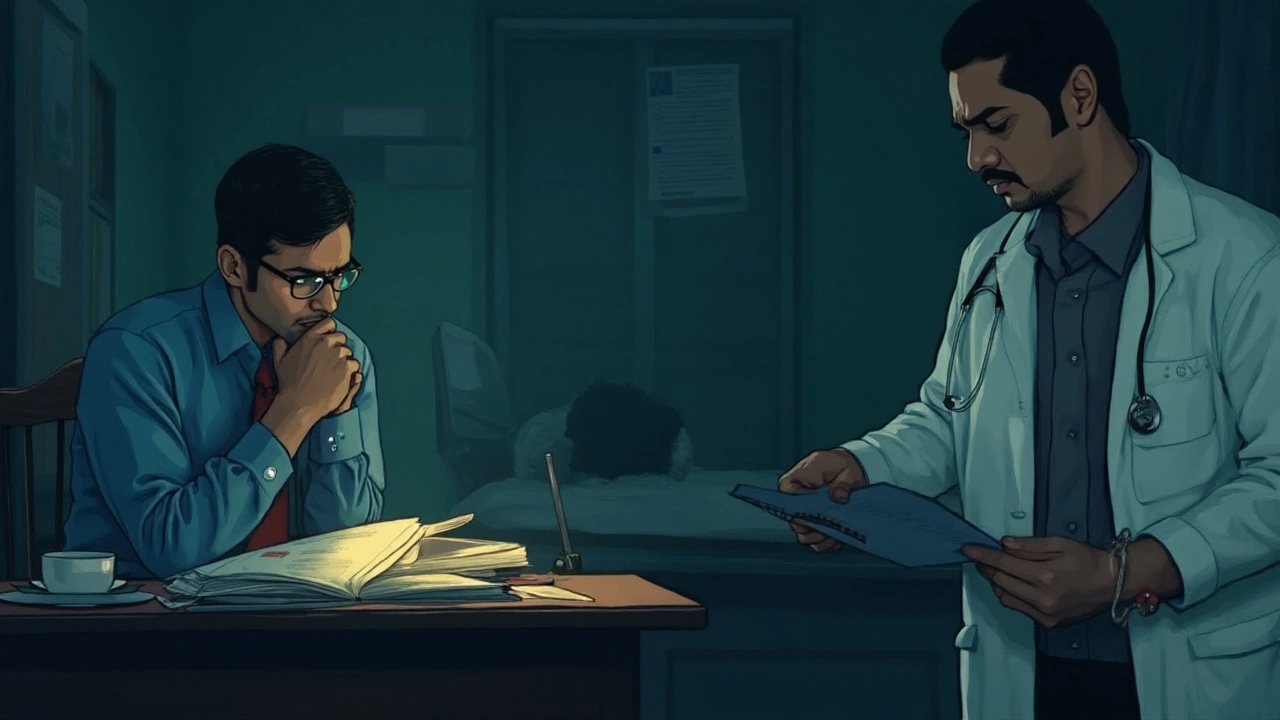Ever noticed how family gatherings often spark that stuck-on-repeat debate: "Who really has it harder, doctors or lawyers?" People tend to imagine lawyers sipping espressos in wood-paneled offices while doctors race through chaotic hospital corridors. Pretty tempting to declare one career the clear winner. But honestly, the answer isn’t black and white—it’s tangled in years of training, stamina tests for your brain, and very different work cultures.
The Long Road: How Do the Studies Compare?
If you’re weighing these careers, let’s get one thing straight—both tracks will eat up a hefty chunk of your life. In India, for example, getting that law degree usually means three to five years in college, depending on whether you dive in after high school or after a bachelor’s. A five-year integrated law course, like the BA LLB, blends legal skills right from the start. You graduate, get yourself enrolled with the Bar Council, and you’re good to try out as a fresh lawyer.
Medicine, though, takes the long view. Just snagging a seat in a medical college means cracking the NEET-UG exam, which, in 2024, saw nearly 2.4 million students compete for 108,915 MBBS seats nationwide—a ratio that would make your head spin. Survive this, and you’re up for 5.5 years (including the one-year internship) just to get your MBBS degree. But it rarely ends there—most doctors chase a post-grad degree or super-specialization, which can tack on another 3 to 7 years. That’s a lot more midnight oil.
Some say law studies require tireless reading, decoding complex cases, and learning to think from multiple angles. But medical students juggle a mountain of information too—anatomy, pharmacology, surgery—sometimes cramming encyclopedia-sized textbooks. The hours don’t let up either. Medicine has its notorious 36-hour shifts and never-ending rounds. Law students, on the other hand, pull all-nighters over moot court prep or internships in bustling city courts.
What’s Tougher on the Mind? Mental Workload and Stress
Alright, let’s talk about what it’s actually like when you’re in the trenches. Law is all about critical thinking, rapid reading, and public speaking. You have to know your way around legal terms, but you also need to think outside the rules to build a clever defense or closing argument. Every client’s story is wildly different, and missing details can kill a case. Every time you open your mouth in court, you’re on display—there’s a lot of pressure not to fumble under questioning. At the same time, law schools can make you feel invisible; top firms rarely recruit from outside a handful of universities, so grinding through law school doesn’t always guarantee a step up.
Doctors, meanwhile, walk a far riskier tightrope. Patient life rests on each call—a wrong diagnosis or misstep can have real blood-and-bone consequences. Work can spill way past normal business hours, with overnight shifts and emergencies coming at the most inconvenient hours. And the pressure to always be "on" isn’t just textbook. A 2023 study from the Indian Council of Medical Research found over 46% of junior doctors rated themselves as "highly stressed." Burnout, depression, and anxiety are real issues, and support systems aren’t always strong. But law isn’t a breeze mentally either. The competition to make partner can feel cutthroat, with long cases and shifting laws acting like mental hurdles. Both jobs make you work for your sleep.

Career Rewards: Money, Job Security, and Prestige
Here’s where things get spicy. Let’s bust a myth: neither career turns you instantly rich. Fresh law grads straight out of ordinary colleges might struggle landing stable jobs at all. In 2024, the average starting salary for a junior advocate in Indian lower courts still hovers around ₹10,000–15,000 a month. Law firm jobs pay more, but only the top 1% score these gigs. Corporate legal roles, judiciary exams, and a private practice can eventually pay well—but expect years of hustle before the cash flows easily.
Medicine is expensive on both the wallet and soul, but the rewards do come. Even junior resident doctors get stipends—usually ₹60,000–80,000 per month in government hospitals. But private sector salaries vary wildly. Specialists and surgeons can earn much more, especially in metros, but the road there is pockmarked with long study hours, late nights, and fierce competition for post-grad seats. In the end, doctors usually enjoy more job security, since demand for good healthcare never vanishes. Plus, a survey by the Association of Indian Doctors in April 2025 showed that while over 79% felt overwhelmed at work, nearly four out of five were proud of their contribution. Prestige and community respect come packaged with the job, though that can’t always pay the rent.
Here’s a side-by-side that tells the story best:
| Aspect | Law | Medicine |
|---|---|---|
| Education Length | 3-5 years (UG/Integrated) | 5.5 years (MBBS) + 3+ years (PG/Specialization) |
| Entry Difficulty | Medium (CLAT, LSAT etc.) | High (NEET-UG, PG competition) |
| Starting Salary | ₹10,000–35,000/month | ₹60,000–1,00,000/month |
| Work Hours | 8–12 (can stretch in litigation/corp.) | 12–36 (with emergencies/on-call) |
| Job Security | Medium (networking critical) | High (especially in public sector) |
| Social Prestige | High (elite firms/judges) | Very High (doctors/surgeons) |
So, Is Law “Easier”? The Truth Behind the Stereotypes
Plenty of folks assume law is the easier route. Here’s the catch: "Easy" is up for debate. If you’re a natural debater, love finding loopholes, or can read 100 pages before breakfast, law might actually fit your talents. But law jobs in 2025 are super diverse. The life of a corporate contract lawyer is far removed from a criminal defense attorney battling for bail in a grimy courtroom. Some areas, like intellectual property or environmental law, demand science backgrounds on top of legal savvy. Others need you to master paperwork and negotiation skills, not just oratory power.
For medicine, "hard" isn’t just about brainpower, but emotional fortitude. You’ll see people at their worst—and sometimes lose patients too. The long roster of exams, internships, and fraternally competitive environments don’t help. But those who love science, making a difference daily, or enjoy teamwork thrive here, despite the insane schedules. And medicine in 2025 isn’t only about clinics—it can mean research, health policy, or telehealth, too.
Don’t buy into the TV drama versions of these careers. Real lawyering isn’t all jaw-dropping summations, and not every doctor spends their day in life-or-death surgeries. Each career has its own blend of grind and glory, and being "easier" or "harder" depends more on who you are than what the degree says. If you’re chasing money alone, both fields demand years before the real payoff comes—if it ever does.

Tips for Choosing: What Suits You Best?
Still trying to pick sides? Here’s something to chew over:
- Check your strengths—not just in studying but in handling people, deadlines, and setbacks. Law needs relentless readers, sharp critical thinkers, and solid speakers. Medicine needs stamina, empathy, and nerves of steel.
- Talk to real professionals, not just guidance counselors. Intern with a lawyer or shadow a doctor for a few days; the small stuff (like paperwork mountains) can be revealing.
- Research entrance exams and acceptance ratios. CLAT or AILET for law can be tough, but NEET makes medicine one of the hardest gates to unlock in India today.
- Imagine your ideal day—not just the cherry-picked highlights but the grind as well. The "easier" career is often the one that feels less like work and more like a purpose.
- Don’t choose only based on money. Both professions often start slow and pay better with years of experience and specialization.
Both law and medicine reshape you, inside and out. Whether you see yourself in a courtroom or emergency room, make the choice that feels right, not just the one that sounds impressive. If you ever feel lost, remember that switching tracks later is possible—plenty of doctors become hospital administrators, and lawyers branch into business or policy. Careers are marathons, not sprints.
